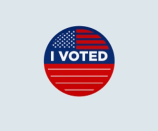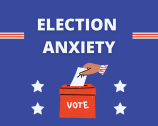Calming Election Anxiety: How to Stay Informed Without Losing Your Peace of Mind
Calming Election Anxiety: How to Stay Informed Without Losing Your Peace of Mind

Election season can be a time of heightened anxiety and uncertainty. With continuous news cycles and passionate conversations, it’s easy to feel overwhelmed or powerless. Many people find themselves swinging between compulsively checking the news for updates and completely avoiding it to prevent getting triggered. Neither extreme is helpful, and both approaches can increase feelings of anxiety and stress. The key to managing election-related anxiety lies in embracing a balanced approach, staying present, and challenging catastrophic thoughts about the future.
Balance Your News Consumption
When uncertainty is high, the urge to seek certainty by over-checking the news can feel almost automatic. However, constantly refreshing your newsfeed only amplifies your anxiety, as your mind never gets a break from the barrage of headlines. On the other hand, avoiding all news to protect yourself from uncomfortable feelings creates a false sense of security and keeps you out of the loop.
Instead, aim to engage mindfully with news and updates. Set specific times to check the news during the day, rather than letting it be a constant background noise. You might choose to catch up for 20 minutes in the morning and then briefly in the evening. When you do check, notice how you’re feeling and give yourself permission to step away if you find your emotions escalating. Remember, staying informed doesn’t require you to consume every update or alert. It’s about striking a balance that allows you to be aware of what’s happening without feeling consumed by it.
Mindfully Return to the Present Moment
It’s natural for your mind to wander to worries about potential outcomes or ‘what-ifs.’ However, these concerns can often spiral into feelings of helplessness or a loss of control. Whenever you notice your thoughts drifting, gently guide your attention back to the present moment. You can do this by focusing on your breath, engaging your senses, or practicing grounding techniques like feeling your feet on the floor or noticing five things in your surroundings.
Mindfulness isn’t about ignoring reality; it’s about allowing yourself to experience what’s happening right now instead of getting pulled into an uncertain future. Building this skill can help you return to a state of calm and clarity, even in the midst of political turmoil.
Challenge Catastrophic Thoughts
Election anxiety often involves catastrophic thinking, where your mind jumps to worst-case scenarios about the future. This type of thinking creates a sense of urgency and fuels your anxiety. For example, you might think, “If the outcome doesn’t go the way I hope, everything will be ruined.” But this kind of all-or-nothing thinking isn’t grounded in reality and overlooks the complexity of most situations.
When you notice catastrophic thoughts creeping in, pause and ask yourself: “Is this thought an accurate reflection of reality, or am I predicting the worst-case scenario?” Consider what other possible outcomes exist and remind yourself that no one can predict the future with certainty. Challenge yourself to develop more balanced and realistic predictions, focusing on what you can control rather than what you can’t.
Practice Compassionate Awareness
It’s essential to acknowledge that this anxiety comes from a place of caring about what happens. Election outcomes matter, and it’s okay to feel invested. By allowing space for your emotions without letting them take over, you can more effectively channel your energy into meaningful actions, such as voting, advocating for causes, or engaging in thoughtful conversations.
Approaching election season with compassion for yourself and others can help you maintain your emotional well-being. If you find yourself caught in unhelpful patterns like over-checking the news or completely avoiding it, treat yourself with the same kindness and understanding you would offer to a friend.
Conclusion
Election anxiety is real, and it’s rooted in the human need for certainty and control. However, we can’t know or control everything about the future, no matter how many headlines we read. Instead of getting caught in cycles of over-checking or avoidance, strive to engage with news mindfully and in moderation. Practice returning to the present moment and noticing when catastrophic thoughts take over. With a balanced approach, you can stay informed and grounded while taking care of your mental health during this intense time.
This article was originally published on Lightonanxiety.com




















